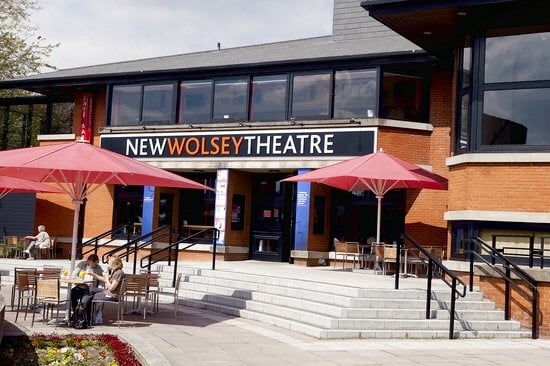
Rapid results
An innovative regional theatre has used data and cloud technology to increase ticket sales and diversify its business model, explains Libby Penn.
After years of funding cuts and the ongoing uncertainty about state support, arts organisations – particularly those outside London – are taking more control over their own destinies. In the case of Ipswich’s New Wolsey Theatre, reshaping its business model to adopt new approaches to marketing and decision-making is reaping big rewards.
The theatre, a 400-seat venue catering to local audiences and the surrounding area of Suffolk, had traditionally been run on a 60% funded and 40% earned income basis. After labouring under the harsh realities of austerity, it wanted to “flip that ratio around to make sure our artistic output didn’t suffer”, according to Stephen Skrypec, Head of Sales and Marketing. He explains: “Back in 2013 we recognised the need to rethink how we were operating. Focusing on earned income meant we needed to make more informed decisions about programming and pricing, and use data to support the strategy. We had hunches about what we were doing but needed to be able to prove it and get any change we made right.”
The theatre engaged US-based consultants TRG Arts. First, they analysed the theatre’s historical audience data, rescaled the house and pricing and designed a segmentation scheme suited to the audience, programme and community. They also identified frequent bookers for targeting with a new season ticket and changed the benefits of the existing friends scheme to encourage growth. By increasing engagement with frequent attenders they hoped to find opportunities to increase revenues by cross-selling additional purchases and moving more frequent bookers up the value and loyalty path.
As we demonstrated in our recent data study of the UK arts industry, the Pareto principle applies to theatre revenue as well, with the top third of frequent bookers typically accounting for about half of theatre earned revenue.
The New Wolsey implemented the new segmentation scheme using the existing Spektrix box office management software, which includes ticketing, marketing, CRM, fundraising and fast audience analytics. It allowed the sales and marketing team to design bespoke campaigns aimed at the different customer groups it had created.
First-time bookers were targeted initially with an offer to encourage re-attendance, and automated emails were set up to go out at the end of each week to inform those on opt-in lists about upcoming performances and special offers.
The initiative to re-scale the house, introduce dynamic pricing and front-fill the auditorium encourages and rewards early booking and reduces the cost of sale per customer. Customer tagging options tell the ticket sales team who to ask for a donation, who to upsell a season ticket to or who to welcome back, creating and building relationships with a long-term goal of increasing loyalty.
The theatre was also able to implement a dynamic pricing system, based on report demand signals specific to each performance. With dynamic pricing, the theatre makes daily adjustments to seat prices, offering advance discounts to encourage take-up for performances where ticket sales are slower, while maximising revenue on those performances in high demand.
On the fundraising front, the theatre can now identify people who donate regularly and use that information for a separate campaign. The team has pulled out those customers who have donated the equivalent of an annual ‘Friend’ membership and offered a free Friend status in return, moving them on to a path of increased attendance, donation, engagement and loyalty.
The theatre has also experimented with the versatility of its cloud-based box office management software to enter new markets. As the system can be accessed anywhere that has an internet connection, the theatre can offer an outsourced ticketing service to local creative festivals and organisations, creating pop-up box offices whenever a non-traditional venue is used, such as last year’s SPILL Festival (which it provided ticketing services to) in a disused police station. The New Wolsey charges an inside commission on each ticket, diversifying its revenue stream while extending technological support to local arts organisations without a formal box office infrastructure.
The result of rethinking its business strategy and adopting data-led decision making has been impressive. In just one year the theatre has seen the following:
- 24.4% increase in customers seeing four or more shows;
- 69.2% increase in customers seeing eight or more shows;
- 31.5% increase in box office gross;
- 31.5% increase in average price paid;
- 66.5% increase in the value of its friends membership scheme.
All this with no impact on ticket sales or the number of households attending the venue.
New operational efficiencies have been identified as well. “Because the system is so easy to use, it’s allowed us to restructure our department,” said Stephen Skrypec. “There is no need for separate sales, development and box office teams. We operate now as one fully integrated unit, which is so much better for sharing information, developing customer relationships and analysing and using that all important data.”
Despite the focus on increasing earned revenues, the theatre has also remained true to its community mission, making sure that 40 tickets at £10 are available for every performance as well as a flat season-wide offer of £10 tickets for anyone aged under 26.
Libby Penn is Managing Director of UK-based Spektrix.
www.spektrix.com
This article is part of a series, sponsored and contributed by Spektrix, aiming to provoke new thinking in how we use ticketing and CRM systems to maximise revenue and grow audiences.
Join the Discussion
You must be logged in to post a comment.